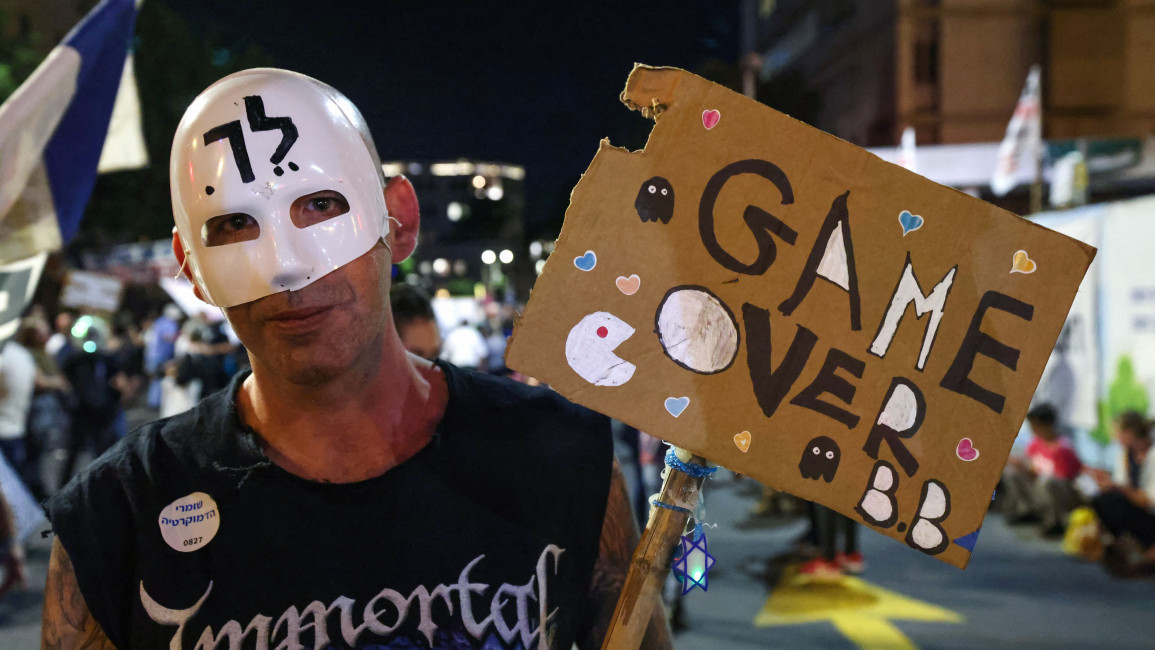'Bibi Ciao': Anti-Netanyahu protesters claim 'victory' on eve of Israel vote
Around 2,000 people demonstrated on Saturday night outside the Jerusalem residence of Benjamin Netanyahu on the eve of a crucial vote in parliament that could end the reign of Israel's longest-serving prime minister.
Parliament is to vote on whether to install a "change" coalition government and end Netanyahu's 12 consecutive years in power.
The anti-Netanyahu bloc includes parties from the right, the left and centre as well as an Arab Islamic conservative party - united by hostility to the rule of the premier known by his nickname Bibi.
To the tune of the Italian partisans' Bella Ciao song, protesters belted out "Bibi Ciao" in celebration after nearly a year of rallies outside his home demanding his departure from office.
"For us, this is a big night and tomorrow will be even a bigger day. I am almost crying. We fought peacefully for this and the day has come," said protester Ofir Robinski.
"Netanyahu only tried to divide us and set each part of society against the other. But tomorrow we'll be united: right, left, Jews and Arabs."
Protesters blew vuvuzelas or beat drums, while some wore T-shirt that read in Hebrew: "Bibi Lekh" (get out).
"We are about to be done with a dark era for Israel," said Ram Shamir.
Another protester, Gali Israel Tal, 62, was also optimistic that the Knesset vote on Sunday would spell Netanyahu's political demise.
"This is our last Saturday here. We won. Tomorrow the Knesset will vote and this prime minister will go. It is good. He will go," she said.
Anti-Netanyahu protests have been staged each Saturday since July last year to denounce his handling of the Covid-19 pandemic and the economy.
Protesters have condemned Netanyahu who became the first sitting Israeli prime minister indicted while in office, and is on trial for corruption.
He is accused of accepting improper gifts and seeking to trade regulatory favours with media moguls in exchange for positive coverage - allegations which he denies.
The end of Netanyahu
On Friday, a new Israeli government signed its final coalition agreements in a move that is spells the end of Benjamin Netanyahu’s 12-year tenure as prime minister.
The new government, set to take office on Sunday, will include for the first time a party from Israel's Palestinian minority, as well disparate elements ranging from the far-right to the left.
Bennett, of the right-wing Yamina party, and Yair Lapid, of the centrist Yesh Atid, had announced last week they had reached a deal to form a coalition.
Israeli Prime Minister is attempting to cling on to power, after failing to obtain a majority of parliamentary seats in a historic election in March, Israel’s fourth vote in two years.
In the final days of his premiership, he is ratcheting up allies to pressure Knesset members against voting in favour of the new government, conjuring conspiracy theories and lashing out at his opponents.
The longest-serving prime minister said he was the victim of a "deep state" conspiracy and accused his opponents of betraying their voters.
"They are eradicating the good and replacing it with the bad and dangerous," Netanyahu said in a televised interview with Channel 2 this week. "I worry about the fate of the country."
Similarly to his American ally, former President Donald Trump, Netanyahu blamed his electoral debacle on fraud and other external causes and lashed out at an array of perceived enemies, including the media, the judiciary and the police.
"We have witnessed the biggest election fraud in the country’s history," Netanyahu said at a Likud meeting this week.
In a tweet published on Thursday, the Likud group said Netanyahu’s remarks were not aimed at the counting process and that the party fully trusted the electoral process. "There is no doubt about the peaceful transition of power," it said.



